Reprezentacija »madžarske usode« – neohistoricizem v politiki in ljudski kulturi
Ključne besede:
Hungary, history, politics, neohistoricism, nationalismPovzetek
REPRESENTATION OF THE »HUNGARIAN DESTINY«: NEOHISTORICISM IN POLITICS AND PEOPLE'S CULTURE
The author describes the so-called neohistoricism in Hungary during the government of Viktor Orbán (1998-2002), encouraged by the government’s own political needs and based on awakening the famous past, used for contemporary (current) political purposes. Just like all populist parties, Fidesz as the ruling party in Hungary resorts to every trick of nationalism, and in its actions it pays no heed to any ideological consistency. For its propaganda purposes this party has abused every historical event and historical character, from the thousand-year anniversary of the establishment of the Christian Hungarian state and King Stephen I to Admiral Horthy as well as a shaman from Tuva (located in the geographic centre of Asia), who carried out a ritual of honouring the ancestors and a cleansing ceremony in front of the Stephen’s crown and its guard in the Hungarian Parliament on the national holiday of the Hungarian revolution (15 March). Neohistoricism has a strong nationalist implication, for example, it keeps mentioning the »unjust peace« from the Treaty of Trianon and rekindling the dreams about the »Greater Hungary«.
Prenosi
Objavljeno
Številka
Rubrika
Licenca
Avtorji prispevkov, objavljenih v tej reviji, soglašajo z naslednjimi pogoji glede avtorskih pravic:
- Avtorji ohranijo avtorske pravice, reviji pa odobrijo pravico do prve objave. Delo se hkrati zaščiti z licenco za prosto uporabo avtorskih del (Creative Commons Attribution License), ki drugim osebam omogoča deljenje dela ob priznanju avtorstva in prve objave v tej reviji.
- Avtorji lahko sklenejo ločene dodatne pogodbene dogovore za neizključno distribucijo različice dela, objavljene v reviji, (npr. oddaja v institucionalni repozitorij ali objava v knjigi) z navedbo, da je bilo delo prvič objavljeno v tej reviji.
- Pred postopkom pošiljanja in med njim lahko avtorji delo objavijo v spletu (npr. v institucionalnih repozitorijih ali na svoji spletnih strani), k čemer jih tudi spodbujamo, saj lahko to prispeva k plodnim izmenjavam ter hitrejšemu in obsežnejšemu navajanju objavljenega dela (glej The Effect of Open Access).


